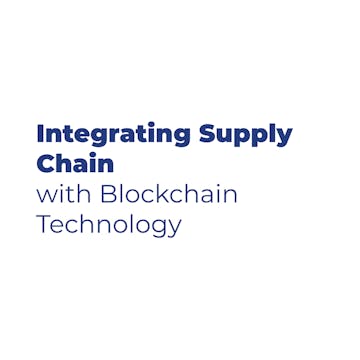
By the end of this project, you will be able to work “hands-on” with a Blockchain demo platform and apply a supply chain use case on a simple Blockchain as a service (BaaS) platform. Throughout the project, you will be able to identify the basic principles of Blockchain technology and the difference between blockchain and a database. You will be able to define the basic attributes for implementing your own Blockchain application. You will also be aware of the questions you should ask yourself to achieve a successful supply chain integration through blockchain application. Finally, you will implement a blockchain application...
Read more
Good to know
Save this course
Reviews summary
Supply chain integration with blockchain
Activities
Blockchain Basic Principles
Show steps
Review the basic principles of blockchain technology to strengthen your foundation for this course.
Browse courses on
Blockchain Fundamentals
Show steps
-
Read articles or blog posts about blockchain technology.
-
Watch videos or tutorials on blockchain basics.
Course Materials Compilation
Show steps
Stay organized and reinforce your learning by compiling notes, assignments, and study materials.
Show steps
-
Create a study guide or notebook to organize course materials.
-
Review and update your notes regularly.
Blockchain Demo Platform
Show steps
Get hands-on experience by working with a blockchain demo platform. This will enhance your understanding of blockchain applications.
Show steps
-
Sign up for a blockchain demo platform.
-
Create a simple blockchain application.
-
Test and debug your application.
Four other activities
Expand to see all activities and additional details
Show all seven activities
Supply Chain Use Case on BaaS
Show steps
Explore a supply chain use case implemented on a Blockchain-as-a-Service (BaaS) platform.
Show steps
-
Find tutorials or documentation on supply chain use cases on BaaS.
-
Follow the tutorial to implement a simple supply chain application.
Blockchain Industry Meetup
Show steps
Connect with professionals in the blockchain industry to expand your knowledge and network.
Show steps
-
Attend local blockchain meetups or conferences.
-
Engage with speakers and attendees.
Blockchain Development Exercises
Show steps
Reinforce your understanding of blockchain development concepts through practice exercises.
Show steps
-
Solve coding challenges or puzzles related to blockchain.
-
Participate in online coding competitions focused on blockchain.
Blockchain Application Proposal
Show steps
Develop a proposal for a blockchain application that addresses a specific business problem.
Show steps
-
Identify a business problem that can be solved using blockchain.
-
Design a blockchain-based solution for the problem.
-
Create a proposal outlining the solution, benefits, and implementation plan.
Blockchain Basic Principles
Show steps
Review the basic principles of blockchain technology to strengthen your foundation for this course.
Browse courses on
Blockchain Fundamentals
Show steps
- Read articles or blog posts about blockchain technology.
- Watch videos or tutorials on blockchain basics.
Course Materials Compilation
Show steps
Stay organized and reinforce your learning by compiling notes, assignments, and study materials.
Show steps
- Create a study guide or notebook to organize course materials.
- Review and update your notes regularly.
Blockchain Demo Platform
Show steps
Get hands-on experience by working with a blockchain demo platform. This will enhance your understanding of blockchain applications.
Show steps
- Sign up for a blockchain demo platform.
- Create a simple blockchain application.
- Test and debug your application.
Supply Chain Use Case on BaaS
Show steps
Explore a supply chain use case implemented on a Blockchain-as-a-Service (BaaS) platform.
Show steps
- Find tutorials or documentation on supply chain use cases on BaaS.
- Follow the tutorial to implement a simple supply chain application.
Blockchain Industry Meetup
Show steps
Connect with professionals in the blockchain industry to expand your knowledge and network.
Show steps
- Attend local blockchain meetups or conferences.
- Engage with speakers and attendees.
Blockchain Development Exercises
Show steps
Reinforce your understanding of blockchain development concepts through practice exercises.
Show steps
- Solve coding challenges or puzzles related to blockchain.
- Participate in online coding competitions focused on blockchain.
Blockchain Application Proposal
Show steps
Develop a proposal for a blockchain application that addresses a specific business problem.
Show steps
- Identify a business problem that can be solved using blockchain.
- Design a blockchain-based solution for the problem.
- Create a proposal outlining the solution, benefits, and implementation plan.
Career center
Blockchain Developer
Supply Chain Manager
Data Scientist
Business Analyst
Project Manager
Software Engineer
IT Manager
Information Security Analyst
Compliance Officer
Financial Analyst
Marketing Manager
Sales Manager
Customer Success Manager
Product Manager
Operations Manager
Reading list
Share
Similar courses
OpenCourser helps millions of learners each year. People visit us to learn workspace skills, ace their exams, and nurture their curiosity.
Our extensive catalog contains over 50,000 courses and twice as many books. Browse by search, by topic, or even by career interests. We'll match you to the right resources quickly.
Find this site helpful? Tell a friend about us.
We're supported by our community of learners. When you purchase or subscribe to courses and programs or purchase books, we may earn a commission from our partners.
Your purchases help us maintain our catalog and keep our servers humming without ads.
Thank you for supporting OpenCourser.



